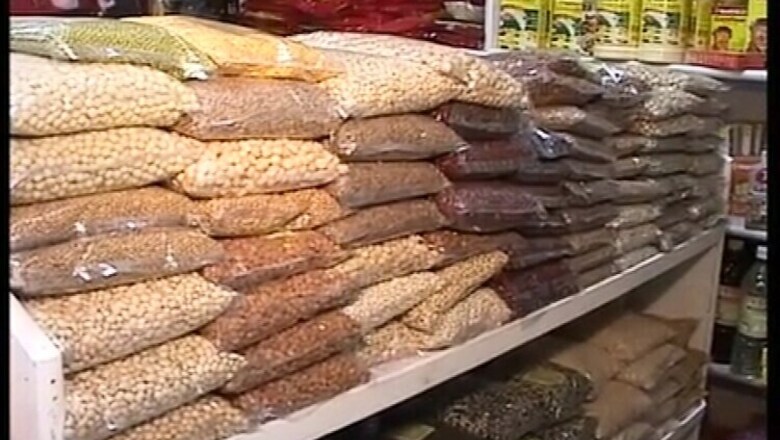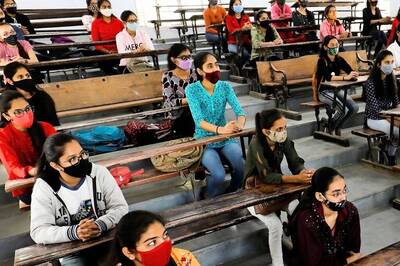
views
New Delhi: Pulses prices have dropped by around Rs 20 per kg in retail market following government crackdown on hoarders even as Finance Minister Arun Jaitley promised rates will ease further with new harvest.
Average dal prices have eased to Rs 185-190 per kg, down from peak of Rs 210 per kg. "Pulses (from the kharif crop) have also started coming. There is also arrival of pulses in international market," Jaitley said expressing hope that the yield of the next harvest is expected to be better, which will further bring down the prices.
He said that in almost all states, prices of pulses have started moderating in last 5-7 days and lentils are being sold at Rs 120 per kg through Safal retail outlets in Delhi.
Jaitley also chaired a high-level meeting to review the prices of essential commodities ahead of the festive season. During the meeting, he asked Agriculture and Food & Consumer Affairs ministries to boost procurement of pulses for creation of buffer stocks.
In an official statement, the government said wholesale and retail prices of pulses have moderated in the last two weeks following the sustained de-hoarding operations. "On an average, prices across the country have declined by about Rs 20 per kg," it added.
With the ongoing market arrival of urad dal and expected arrival of new crop of arhar dal in early December, the government said that "prices would ease further".
The supply situation would further improve when 1.3 lakh tonnes of pulses seized by various state governments would be offloaded in the retail market.
As per the Consumer Affairs Ministry data, retail prices of tur dal are ruling as high as Rs 185 per kg, urad dal Rs 190 per kg, moong Rs 135 per kg, masoor dal Rs 107 per kg and gram at Rs 85 per kg.
"The Finance Minister emphasised the importance of ensuring adequate availability of essential commodities and taking proactive steps to hold the price line at reasonable levels," an official statement said.
Jaitely directed the Secretaries of the Departments of Agriculture and Food and Consumer Affairs to remain vigilant, work closely with the states and "take immediate measures, including stepping up procurement of pulses, enhancing and building up of buffer stocks".
The Finance Minister asked all the related departments to ensure that the common citizen has access to adequate supplies of essential commodities in the ensuing months, especially during the festive season.
The meeting was attended by Urban Development Minister Venkaiah Naidu, Minister of State for Agriculture Sanjeev Balyan, Principal Secretary to the Prime Minister and the Cabinet Secretary besides Secretaries of the Departments of Agriculture, Food, Consumer Affairs, Revenue and Commerce.
The Cabinet Secretary also held a video conference with the Chief Secretaries of Maharashtra, Karnataka, Rajasthan, Madhya Pradesh, Chhattisgarh and Uttar Pradesh to review the disposal of pulses seized in the de-hoarding operations.
States have been directed to complete the disposal process and ensure availability of pulses in the retail market at the earliest.
Pulses prices have risen this year sharply as production fell to 17.20 million tonnes in 2014-15 crop year due to poor rains, against 19.25 million tonnes in the previous year.
Earlier in the day, Minister of State for Agriculture Sanjeev Balyan said a Cabinet proposal has been moved for procurement and creating buffer stock of lentils. The Agriculture Ministry has also moved a Cabinet proposal to create a buffer stock of 3.5 lakh tonnes of lentils during the current 2015-16 crop year through domestic purchase or imports to prevent a further price rise in pulses.
Meanwhile, Jaitley said prices of pulses grew also because proper action was not taken by states against the hoarders.
"The rate of inflation has come down in last one and half year. Prices of many commodities have come down. But there are some products, whose arrival is less in the Indian market as well as foreign markets. The requirement of pulses is 22 million tonne in India.
We increased the production up to 17 million tonne but still we are short of 5 million tonne production," Jaitley said at an event.
"Most of the countries from where we used to import pulses have also recorded low production. Some traders took benefit from it and hoarded the commodity. It was the state governments' responsibility to take action and carry out raids," he said.
With intervention of the Centre and states in last few days, a large number of raids have been carried out against hoarders and prices have come down somewhat, he said.
He added that as a result of the raids both kinds of the pulses, arhar or tur dal have come out in the market.




















Comments
0 comment